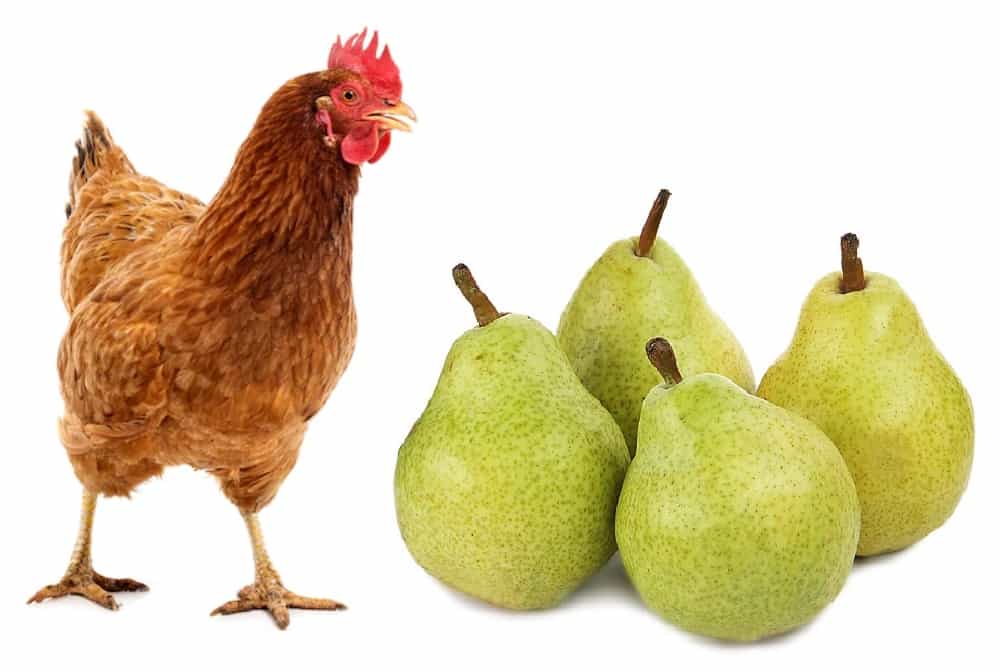Chickens are omnivores, which means they will eat both plants and animals. This diet helps them to get the nutrients they need to stay healthy. While chicken feed typically consists of grains like corn and soy, fruits and vegetables are an important part of a chicken’s diet and they can eat many different types, including pears.
Pears are a good source of vitamins and minerals for chickens. They contain vitamins C and K, as well as potassium and fiber. Pears can be given to the hen whole, or they can be cut up into small pieces.
Chickens can eat pears, but there are a few things to keep in mind.
Can Chickens Eat Pear Skin?
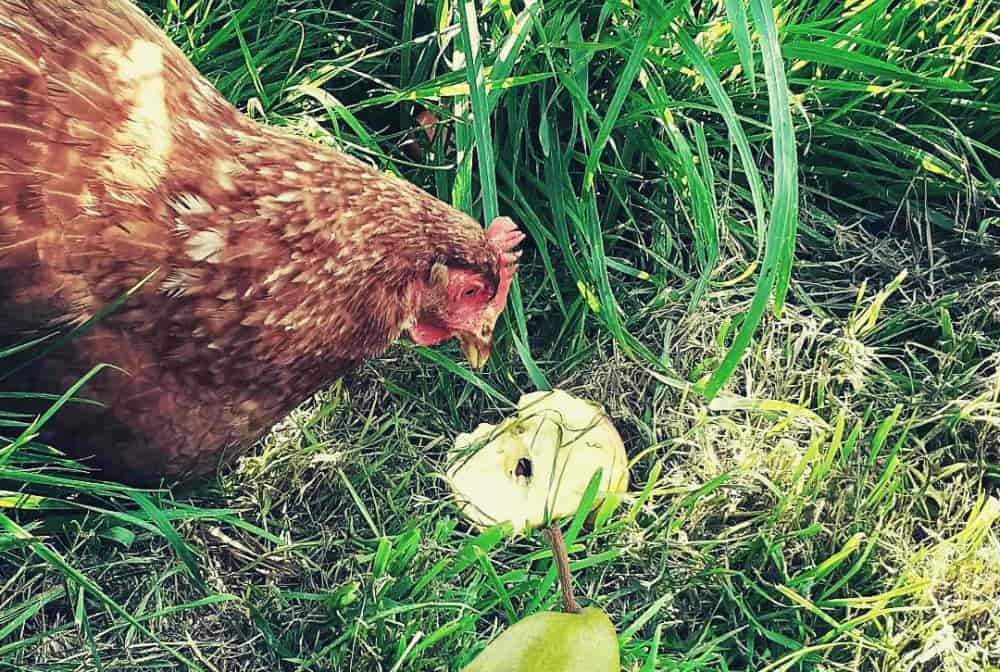
While chicken owners may not think twice about feeding their chickens some leftover pear skin, it’s important to know if this is a safe practice.
The short answer is yes, chickens can eat pear skin. Pear skin is not toxic to hens and contains a number of nutrients that are beneficial to them. However, there are a few things to keep in mind when feeding pear skin to your chickens.
First, pear skin is a good source of fiber. This is important for hens because it helps them digest their food properly. However, too much fiber can lead to digestive problems like diarrhea.
Second, pear skin contains a lot of sugar. Sugar is not bad for chickens, but too much of it can lead to weight gain and other health problems. So, it’s important to only give your chickens a small amount of pear skin at a time.
Finally, pear skin can be a choking hazard for chickens. This is because it’s a small, slippery piece of food that can easily get stuck in their throats. To avoid this, make sure to cut the pear skin into small pieces before giving it to your hens.
Can Chickens Eat Pears Seeds?
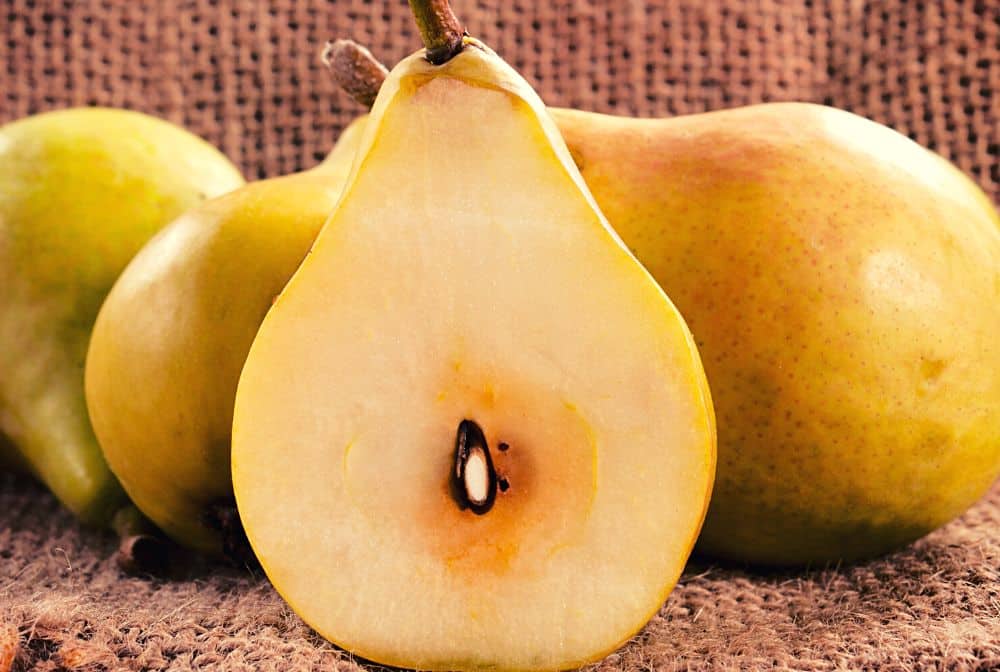
Pear seeds contain antioxidants, which can help boost the immune system. In fact, pear seeds contain a number of nutrients that can be beneficial for chickens, including protein, fat, and fiber. However, pear seeds should not make up a large portion of a chicken’s diet as they can be a choking hazard.
Some chicken owners may choose to avoid feeding their hens pear seeds altogether, as there is a small risk that the seeds could contain cyanide. However, this risk is generally considered to be low. As long as the pear seeds are given in moderation, there is no need to worry about them causing harm to your chickens.
Are there any health benefits to feeding pears to chickens?
There are a few different ways to look at whether there are any health benefits to feeding pears to chickens.
Looking at the nutritional content of pears, they are a good source of fiber, vitamins C and K, and copper. Pears also contain phytonutrients and antioxidants, which are beneficial for chickens. However, it is important to note that hens can get these same nutrients from other fruits and vegetables.
There have not been any studies specifically on the subject of feeding pears to chickens. However, there have been studies on the benefits of feeding fruits and vegetables to hens. These studies have shown that chickens who are fed a diet that includes fruits and vegetables are healthier and have a lower risk of disease.
There is anecdotal evidence from chicken keepers who have fed their chickens pears. These chicken keepers report that their hens seem to enjoy pears and that they are healthy and happy. There is no way to know for sure if the pears are responsible for the health of the chickens, but it is certainly possible.
Pears Optimize Digestion in Chickens
Chickens that eat pears on a regular basis typically have less problems with digestive issues, such as diarrhea and constipation. The fiber in pears also helps to keep chickens feeling full, so they are less likely to overeat and become overweight.
If your chickens are having trouble with digestive issues, try feeding them pears on a regular basis. You may just find that they have less problems and are happier and healthier overall.
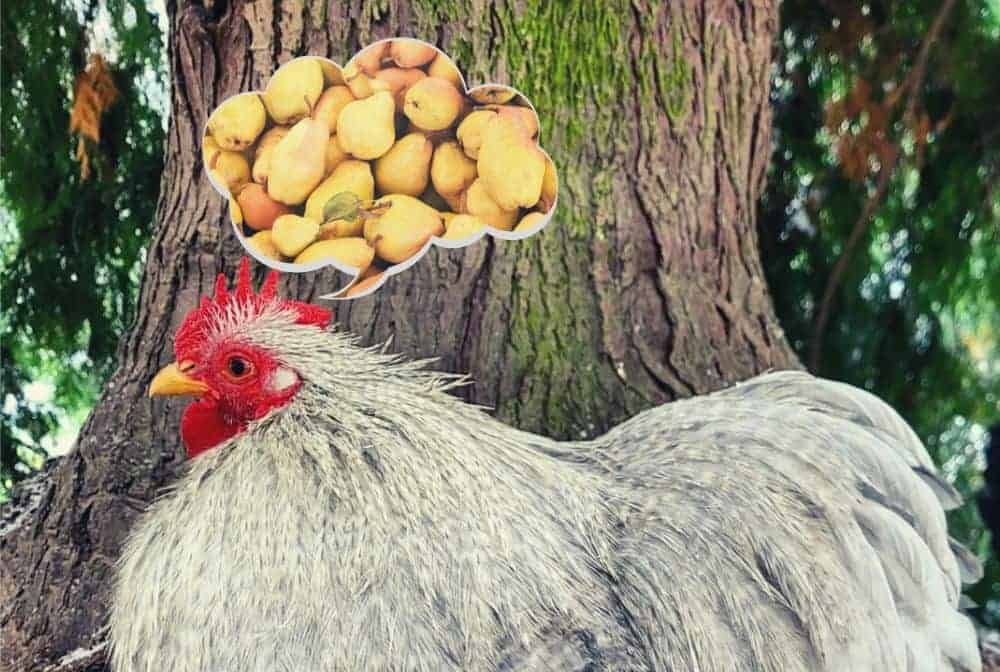
Pears Can Boost Immunity and Provides Antioxidants in Your Chickens
Pears can help keep your chickens healthy and boost their immunity. Hens are susceptible to a number of diseases and illnesses, so it is important to do everything you can to keep them healthy. A healthy diet is essential for chickens, and pears can help.
Pears are a good source of vitamins and minerals, including vitamin C. Vitamin C is important for chickens because it helps them fight off infection. Hen need a lot of vitamin C, and pears are a great way to provide it.
Pears also contain antioxidants, which can help protect chickens from disease. Antioxidants help to neutralize free radicals, which can damage cells and lead to illness. Free radicals are harmful molecules that can damage cells and lead to disease.
Keeps Your Chickens Hydrated
Pears are a healthy and delicious way to promote hydration in chickens. When fed to chickens, pears can help them stay hydrated, especially in hot weather. They need to stay hydrated in order to stay healthy and produce eggs.
Pears help keep hens hydrated because they are high in water content. They also contain electrolytes, which help chickens absorb water.
Improves Blood Circulation and Regulates Heart Health
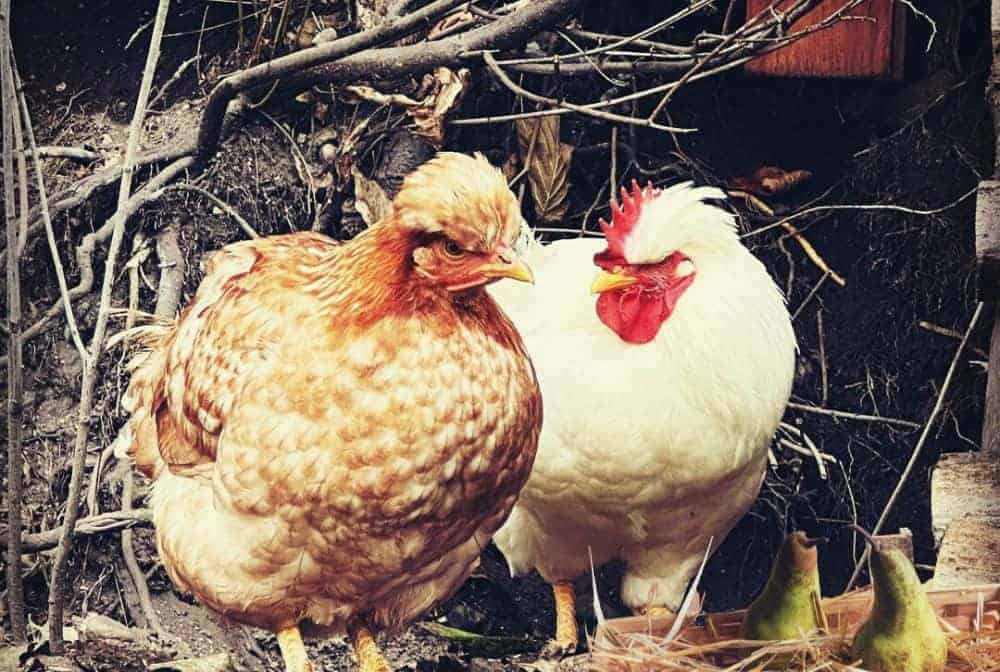
Pears can actually help improve blood circulation in your chickens. This is because pears contain a type of flavonoid called quercetin. Quercetin is a powerful antioxidant that can help improve circulation by helping to prevent the formation of plaque in the arteries.
Pears also contain a type of soluble fiber called pectin. Pectin helps to reduce LDL (bad) cholesterol and increase HDL (good) cholesterol. This is important because cholesterol is a major risk factor for heart disease. By reducing LDL cholesterol and increasing HDL cholesterol, pears can help to reduce the risk of heart disease in your chickens.
Pears also contain a type of polyphenol called catechins, kaempferol. They are powerful antioxidants that can help to protect the cells of the body from damage. They can also help to reduce inflammation. Inflammation is a major risk factor for heart disease.
In addition, the fiber contained in this fruit helps reduce cholesterol levels. Fiber also helps to regulate blood sugar levels, which is important for heart health.
What To Consider When Giving Your Chickens Pears?
There are a few things you should consider before giving them pears:
- Make sure that the pears you give to your chickens are ripe. Unripe pears can cause digestive problems for chickens.
- Avoid giving your hens pears that are bruised or have other blemishes. These pears can contain harmful bacteria that can make your chickens sick.
- Make sure that pears do not contain pesticides. Pesticides can be harmful to hens and may cause health problems.
- Only give your chickens a few pears at a time.
- Make sure you don’t give too many seeds.
By following these simple tips, you can ensure that your chickens stay healthy and happy.
How to Serve Pears to Your Chickens
There are a few different ways you can go about feeding a pear to chickens. Start by giving your hens a few small pieces of pear to try. If they seem to like it, then you can give them a whole pear.
- One way is to cut the pear into small pieces and feed it to them as a snack. Or is to chop it up and mix it with their feed.
- Another way is to cook the pear and then mash it up and feed it to them as a meal.
- And finally, you can also give them a whole pear to peck at and eat.
No matter which way you choose to feed them the pear, it’s important to make sure that the chickens are getting the nutritional benefits that the pear has to offer.
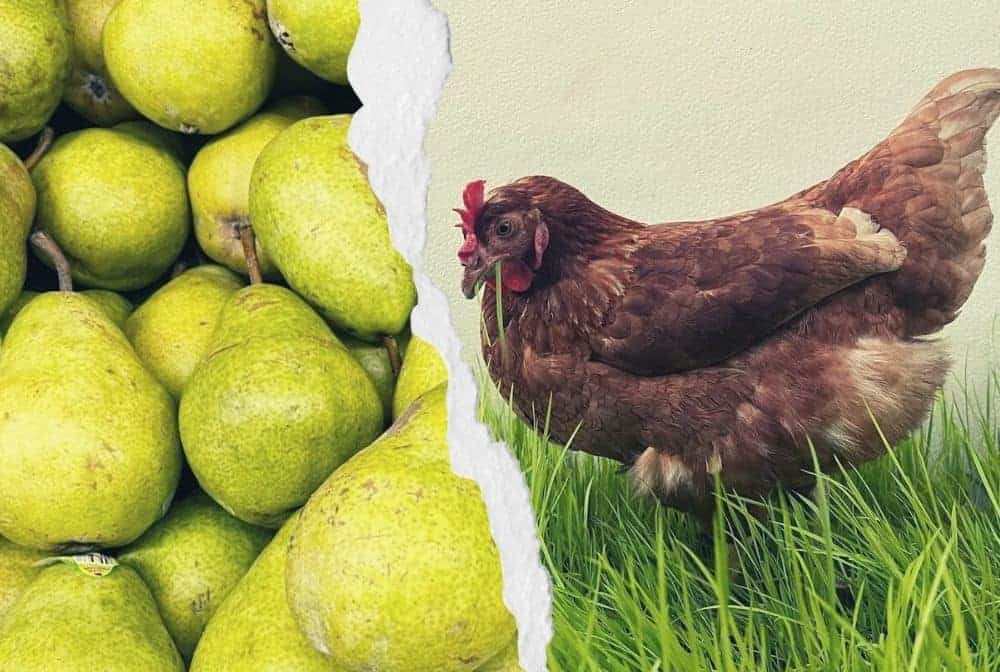
FAQ on Pears for Chickens
Can chickens eat asian pears?
Asian pears are a type of pear that is typically smaller and has a more intense flavor than other types of pears. Hens can eat Asian pears, but they should only have a small amount as they are high in sugar.
What fruits are toxic to chickens?
There are a number of fruits that are toxic to chickens. The most common fruits that are toxic to hens are grapes, raisins, and currants. Such as grapes, can cause digestive problems and even death in chickens. Other fruits, such as cherries, can cause liver damage. It is important to keep these fruits away and control their consumption.
What seeds are safe for chickens?
There are many types of seeds that are safe for chickens to eat. Some of these include sunflower seeds, canary seeds, millet, and corn. It is important to only give chickens seeds that are safe for them to eat, as some seeds can be harmful. Seeds that are harmful to chickens can cause blockages in their digestive system.
At what age should you provide your chickens with pears?
Hens can start to eat pears as soon as they are old enough to eat solid food, around 6 or 8 months old. Young chickens may not be able to digest pears properly, which could lead to digestive problems.
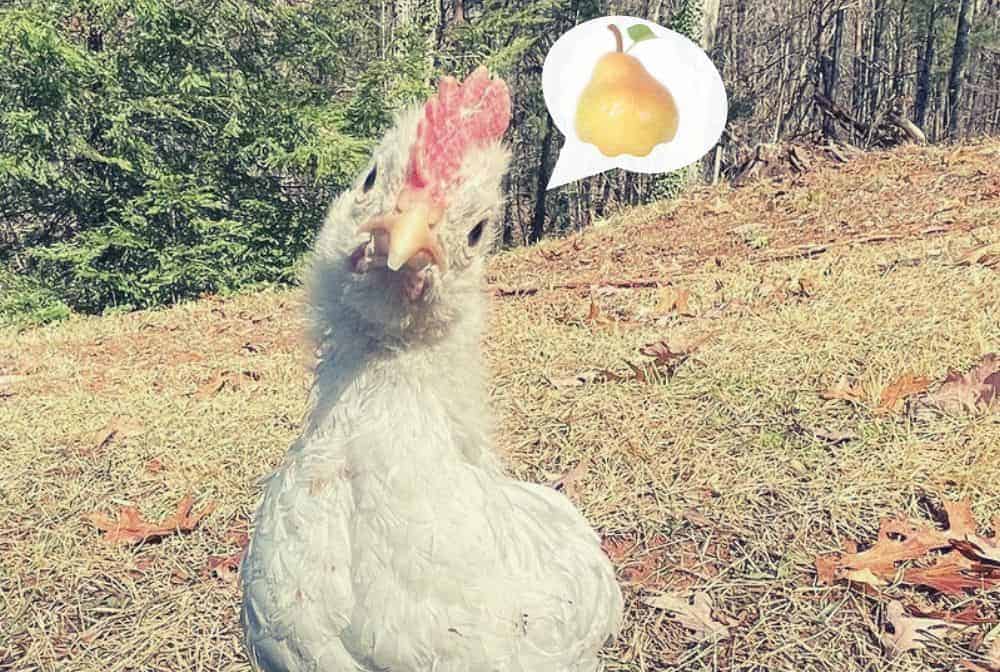
Closing Thoughts
Overall, pears are a healthy treat for chickens and can be given to them. Just be sure to introduce them slowly and feed them in moderation. There (like all fruits and vegetables) should be given in moderation. Hens can fill up on too much fruit and not get the necessary nutrients they need from other food sources.
Pears are a delicious and healthy way to improve the health of your chickens. They have many health benefits that make them a great food to feed to chickens. Give them a try and see how much your chickens love them.
Sources:
- The immune system in chickens, The National Center for Biotechnology Information (National Library of Medicine): https://pubmed.ncbi.nlm.nih.gov/18777262/
- Food micronutrients explained — Antioxidants, anti-inflammatories and phytochemicals, Sarah Rautio, Michigan State University Extension:
https://www.canr.msu.edu/news/food_micronutrients_explained_antioxidants_anti_inflammatories_and_phytoche - Water management key to helping chickens beat the heat, Oklahoma State University: https://news.okstate.edu/articles/agriculture/2020/stotts_water-hot-chickens.html
